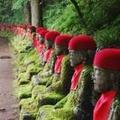LAO-TSEU : Tao Te King, Livre 1: chapitre 23
LAO-TSEU : Tao Te King, Buch 1: Kapitel 23
LAO-TSEU: Tao Te King, Book 1: chapter 23
LAO-TSEU:『タオ・テ・キング』第1巻:第23章
LAO-TSEU: Tao Te King, Boek 1: hoofdstuk 23
LAO-TSEU: Tao Te King, Livro 1: capítulo 23
LAO-TSEU: Tao Te King, Kitap 1: Bölüm 23
老子:《道德经》,第一册:第 23 章
23.
Celui qui 12 ne parle pas (arrive au) non-agir.
Whoever does not speak (arrive at), does not act.
Un vent rapide ne dure pas toute la matinée ; une pluie violente ne dure pas tout le jour.
A fast wind does not last all morning; a violent rain does not last all day.
Qui est-ce qui produit ces deux choses ?
Who produces these two things?
Le ciel et la terre.
Heaven and earth.
Si le ciel et la terre même ne peuvent subsister longtemps 13 , à plus forte raison l'homme !
If the sky and the earth itself can not last long 13, let alone man!
C'est pourquoi si l'homme se livre au Tao, il s'identifie au Tao ; s'il se livre à la vertu, il s'identifie à la vertu ; s'il se livre au crime, il s'identifie au crime.
That is why if man gives himself to the Tao, he identifies himself with the Tao; if he gives himself to virtue, he identifies with virtue; if he indulges in crime, he identifies himself with the crime.
Notes du chapitre 23
| 12 | L'auteur veut dire, dans ce chapitre, que le saint homme oublie les paroles (ou renonce aux paroles) pour s'identifier au Tao.
| 12 | The author means, in this chapter, that the holy man forgets the words (or renounces the words) to identify himself with the Tao.
On a vu plus haut : « Celui qui parle beaucoup finit par être réduit au silence ; il vaut mieux garder le milieu.
We have seen above: "He who speaks much ends by being silenced; it's better to keep the middle.
» Celui qui se laisse aller à la violence de son caractère et aime à discuter, s'éloigne de plus en plus du Tao.
The one who lets himself go to the violence of his character and likes to talk, gets further and further away from the Tao.
Plus loin Lao-tseu compare ces hommes qui aiment à discuter, et dont la loquacité ne peut se soutenir longtemps, à un vent rapide qui ne peut durer toute la matinée, et à une pluie violente qui ne peut durer tout le jour.
Farther Lao-tzu compares those men who like to talk, and whose loquacity can not sustain themselves for a long time, to a rapid wind that can not last all morning, and to a violent rain that can not last all day.
Or le goût immodéré de la discussion vient d'une agitation intérieure de notre âme, de même qu'un vent rapide et une pluie violente sont produits par l'action désordonnée du ciel et de la terre.
Now the immoderate taste of discussion comes from an inner agitation of our soul, just as a rapid wind and a violent rain are produced by the disordered action of heaven and earth.
Si donc le trouble du ciel et de la terre ne peut durer longtemps, il en sera de même, à plus forte raison, de la loquacité de l'homme.
If, then, the trouble of heaven and earth can not last long, it will be the same, all the more so, with the loquacity of man.
| 13 | Suivant Ha-chang-kong , il faut entendre ici, non la durée du ciel et de la terre, mais la durée des choses qu'ils produisent.
| 13 | According to Ha-chang-kong, here we must not understand the duration of heaven and earth, but the duration of the things they produce.
Le ciel et la terre sont doués d'une vertu divine.
||||||gifted|||
Heaven and earth are endowed with a divine virtue.
Cependant, lorsqu'ils se sont unis ensemble pour produire un vent rapide et une pluie violente, ils ne peuvent les faire durer toute la matinée ou tout le jour.
However, when they are united together to produce a fast wind and a heavy rain, they can not make them last all morning or all day.
À plus forte raison l'homme ne pourra-t-il subsister longtemps, s'il se livre à des actes violents et désordonnés.
For all the more reason man can not subsist for a long time if he indulges in violent and disorderly acts.
Les mots « ne pas durer longtemps » correspondent aux mots précédents.
The words "do not last long" correspond to the preceding words.
« ne pas durer toute la matinée, ne pas durer tout un jour ».
"Do not last all morning, do not last all day".
Le vent rapide et la pluie violente sont ici le symbole de la force, de la violence, de l'activité (que blâme Lao-tseu).
The fast wind and the violent rain here are the symbol of strength, violence, activity (blame Lao-tzu).
Ce commentateur paraît penser qu'il s'agit ici du peu de durée qu'auraient le ciel et la terre, s'ils venaient à perdre leur assiette.
|||||||||||would|||||||||||position
This commentator seems to think that it is a question here of the little duration that heaven and earth would have, if they were to lose their attitude.
Dans cette hypothèse, Lao-tseu supposerait qu'ils sont dans un repos absolu, et que ce repos est le gage de leur durée.
In this hypothesis, Lao Tzu supposes that they are in absolute rest, and that this rest is the guarantee of their duration.
On lit dans le chapitre Il, livre II : « Si la terre n'était en repos, elle se briserait.
||||||||||||||||would break
We read in chapter II, book II: "If the earth were not at rest, it would break.

